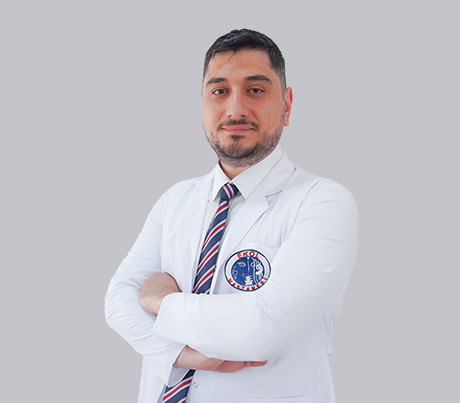The esophagus is a tube from the mouth to the stomach through which food and liquids pass. Esophageal cancer is the rapid growth of cells in this area.
Esophageal cancer can cause symptoms such as difficulty swallowing, chest pain, weight loss, shortness of breath or coughing.
If it is diagnosed at an early stage, the chances of cure may be better. Therefore, if you have symptoms such as difficulty swallowing or chest pain, you should talk to your doctor and have the necessary tests done. The risk of esophageal cancer can be reduced by adopting a healthy diet and lifestyle.
Esophageal cancer is a serious and potentially life-threatening disease characterized by the development of cancerous cells in the esophagus, the long tube that carries food from the throat to the stomach.
This type of cancer typically presents in two main forms: squamous cell carcinoma, which originates in the flat cells lining the esophagus, and adenocarcinoma, which begins in the cells that produce mucus and other fluids. Risk factors for esophageal cancer include smoking, heavy alcohol consumption, chronic acid reflux, and conditions like Barrett's esophagus.
Symptoms often include difficulty swallowing, weight loss, chest pain, and indigestion. Diagnosis is typically made through endoscopy and biopsy, followed by imaging tests to determine the stage.
Treatment options vary depending on the cancer's stage and may include surgery, radiation therapy, chemotherapy, or a combination of these methods. Early detection and treatment are crucial for improving survival rates.
The main types of esophageal cancer are:
These two types of esophageal cancer differ in their location within the esophagus, risk factors, and patterns of occurrence, but both require prompt medical attention and treatment.
The symptoms of esophageal cancer typically become more noticeable as the cancer progresses. Common symptoms include:
It's important to note that these symptoms can also be caused by conditions other than esophageal cancer. However, if you experience persistent symptoms or any significant changes in your swallowing or digestive health, it's advisable to consult a healthcare provider for a thorough evaluation. Early detection and diagnosis are key to better treatment outcomes.
Treatment options for esophageal cancer depend on various factors, including the stage of the cancer, its location, the overall health of the patient, and whether the cancer has spread. The main treatment modalities include:
The choice of treatment is highly individualized and is best decided by a multidisciplinary team of specialists, including oncologists, surgeons, radiologists, and others, who will consider all aspects of the patient's condition and preferences. Early-stage cancers might be treated differently compared to advanced stages, where the focus may shift more towards palliative care to improve symptoms and quality of life.
Esophageal cancer is not among the most common cancers worldwide, but its prevalence can vary significantly based on geographic location, gender, and specific risk factors. Here are some key points to consider:
In summary, while esophageal cancer is not as prevalent as some other types of cancer, such as breast, lung, or colorectal cancer, it remains an important health issue, especially in regions with high-risk populations and among individuals with specific risk factors.
Prevention of esophageal cancer involves reducing the risk factors associated with the disease. While not all cases can be prevented, certain lifestyle changes and medical interventions can significantly lower the risk. Here are some key strategies:
It's important to note that these measures can reduce the risk but not eliminate it entirely. Individuals with a family history of esophageal cancer or other significant risk factors should discuss with their healthcare provider about the best strategies for prevention and early detection.
 Date of birth
10.11.1987
Education and Expertise
Karadeniz Technical University Faculty of Medicine
Kocatepe University
Ankara University Faculty of Medicine
Konya Health Sciences University
Professional Interests:
Obesity (fatness) surgery and metabolic surgery
Laparoscopic reflux surgery
Laparoscopic gallbladder surgeries
Gastric balloon application
ERCP, EMR, ESD (Advanced Endoscopic procedures)
Laparoscopic pancreatic cancer surgery
Laparoscopic gastric and intestinal cancer surgeries
Hemorrhoid surgeries
Perianal fistula surgeries
Laparoscopic abdominal and inguinal hernia surgeries
Oncoplastic Breast cancer surgeries
Natural cancer surgery (NOSE)
Thyroid cancer and goiter surgeries.
Memberships to Scientific Organizations
Turkish Surgery Association
Turkish Obesity Surgery Association
Surgical Oncology Association
National Society of Endoscopic Laparoscopic Surgery
He is a member of the Bariatric and Metabolic Surgery Association.
Courses and Certificates:
Turkish surgical association proficiency exam (Board) certificate of achievement in 2018
He has more than 100 papers presented in national and international congresses and more than 50 articles published in international journals.
Foreign language
English
Date of birth
10.11.1987
Education and Expertise
Karadeniz Technical University Faculty of Medicine
Kocatepe University
Ankara University Faculty of Medicine
Konya Health Sciences University
Professional Interests:
Obesity (fatness) surgery and metabolic surgery
Laparoscopic reflux surgery
Laparoscopic gallbladder surgeries
Gastric balloon application
ERCP, EMR, ESD (Advanced Endoscopic procedures)
Laparoscopic pancreatic cancer surgery
Laparoscopic gastric and intestinal cancer surgeries
Hemorrhoid surgeries
Perianal fistula surgeries
Laparoscopic abdominal and inguinal hernia surgeries
Oncoplastic Breast cancer surgeries
Natural cancer surgery (NOSE)
Thyroid cancer and goiter surgeries.
Memberships to Scientific Organizations
Turkish Surgery Association
Turkish Obesity Surgery Association
Surgical Oncology Association
National Society of Endoscopic Laparoscopic Surgery
He is a member of the Bariatric and Metabolic Surgery Association.
Courses and Certificates:
Turkish surgical association proficiency exam (Board) certificate of achievement in 2018
He has more than 100 papers presented in national and international congresses and more than 50 articles published in international journals.
Foreign language
English